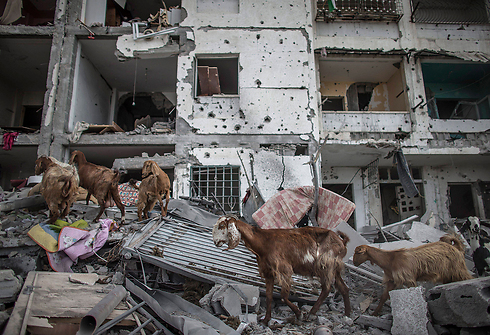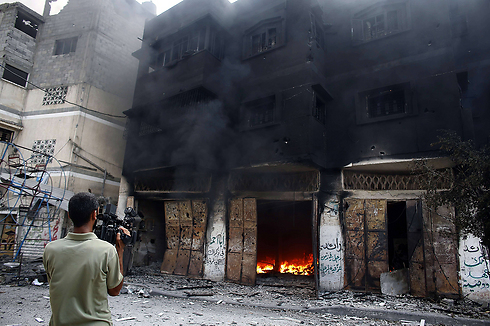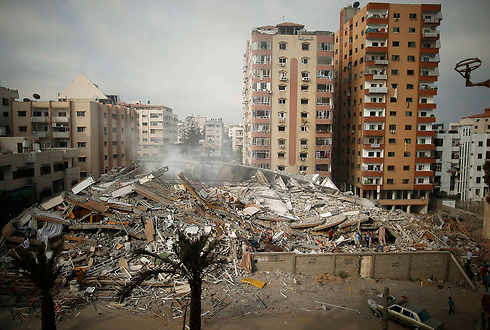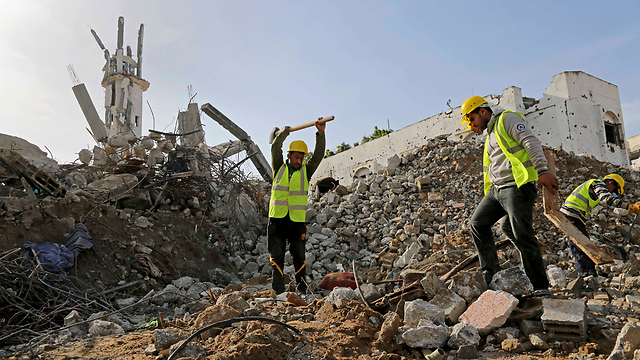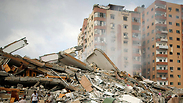
Under the rules of war, homes are considered protected civilian sites unless used for military purposes.
Israel says it attacked only legitimate targets, alleging militants used the houses to hide weapons, fighters and command centers. Palestinians say Israel's warplanes often struck without regard for civilians.
The Associated Press examined 247 airstrikes that -- according to witness accounts and site visits -- hit residential compounds, out of the some 5,000 Israeli strikes during the conflict. Its reporters compiled a detailed casualty count, determining 844 dead in those strikes.
The review found that 508 of those dead -- just over 60 percent -- were children, women and older men, all presumed to be civilians. Hamas says it did not use women as fighters in the war, and an Israel-based research group tracking militants among the dead said it has no evidence women participated in combat.
The AP count also showed that:
Children younger than 16 made up one-third of the total: 280 killed, including 19 babies and 108 preschoolers between the ages of 1 and 5.
In 83 strikes, three or more members of one family died.
Among those killed were 96 confirmed or suspected militants -- or just over 11 percent of the total -- though the actual number could be higher since armed groups have not released detailed casualty lists.
The remaining 240 dead were males between the ages of 16 and 59 whose names did not appear in connection with militant groups on searches of websites or on street posters honoring fighters.
The review was the most painstaking attempt to date to determine who was killed in strikes on homes in the Gaza war, even as Israel's army and Gaza militants have refused to release information about targets and casualties. The count tracked all known airstrikes, but not all strikes had witnesses and damage at sites inspected by the AP wasn't always conclusive.
According to preliminary UN figures, the total Palestinian death toll from the conflict was 2,205. The number of civilians among those killed has been a key issue in the highly charged battle over the dominant narrative of the 50-day war, the third and most destructive confrontation between Israel and Hamas since 2008.
The war erupted in July, after a month of escalating tensions triggered by the abduction and killing of three Israeli teens by Hamas in the West Bank, and an Israeli arrest sweep of Hamas supporters that led to renewed Gaza rocket fire on Israel.
Israel says it tried to avoid harming civilians, even as Hamas embedded weapons and fighters in residential areas in what Israel calls a cynical attempt to drive up the civilian death toll for propaganda purposes.
"Our position is very clear. Israel did not commit war crimes," said Foreign Ministry spokesman Emmanuel Nahshon.
Palestinians say Israel attacked Gaza with disproportionate force and callous disregard for civilians.
"Either they have the worst army in the world that constantly misses targets and hits civilians, or they are deliberately killing civilians," said Hanan Ashrawi, a Palestinian spokeswoman. If most of those killed are civilians, "you cannot call them collateral damage," she said.
Palestinian President Mahmoud Abbas, though a political rival of Hamas, has asked the International Criminal Court to investigate the war, a move that could pave the way for a possible prosecution of both Israel and Hamas.
On its own, a high civilian death toll does not constitute evidence of war crimes, and each strike has to be investigated separately, according to internal law experts, including Alex Whiting of Harvard.
But it "certainly raises a red flag and suggests that further investigation is warranted," said Whiting, a former top official at the ICC in The Hague, Netherlands.
Israel would not say how many of the 5,000 air attacks it carried out during the war were directed at homes. However, it said it only aimed at legitimate military targets.
Asked for comment on the AP's findings, an Israeli army spokesman, Lt. Peter Lerner, said that "one cannot draw broad conclusions" by examining only a small percentage of Israel's airstrikes.
"While loss of civilian life is regrettable, combatting a terrorist organization with semi-state military capabilities that intentionally conceals those capabilities within and beneath homes, schools, hospitals and mosques is the reality of urban warfare," Lerner said.
According to preliminary UN figures, at least 1,483 Palestinian civilians were killed in the war -- 66 percent of the overall death toll of 2,205.
Gaza militants fired about 4,300 rockets and mortar rounds at Israel during the war, according to the Israeli military. The barrage drove tens of thousands of Israelis from their homes to seek cover. Five civilians were killed in Israel, among them a 4-year-old boy, along with 67 soldiers.
Gaza militant groups have not released complete lists of fighters killed in the war. Israel says about 890 militants were killed in Gaza, including 590 from Hamas, 200 from Islamic Jihad and 100 from other armed factions. It did not say how many were killed in airstrikes on homes.
A Hamas official said the group lost about 400 fighters, including many killed in battles with Israeli soldiers and a smaller number who died in house strikes, though he gave no precise figure. The smaller Islamic Jihad group said 135 of its armed men were killed overall.
In the initial stages, the AP's reporting was guided by Al Mezan, a Gaza human rights group, and the Israeli rights group, B'Tselem, which published partial findings on house strikes or provided names of families.
The count included 247 airstrikes in which people were killed in homes or adjacent yards, including those hit by flying shrapnel or debris from attacks on neighboring buildings. The AP looked only at cases where homes were hit from the air, excluding artillery strikes, which are inherently inaccurate.
Starting in November, three reporters visited the vast majority of attack sites, interviewed survivors and collected hundreds of death certificates -- documents recognized by Israel as proof of mortality. The certificates contain birth dates, allowing a breakdown of the dead by age.
Reuven Erlich, who heads the Meir Amit Intelligence and Terrorism Information Center, an Israel-based research group that is tracking militants among the Gaza dead, said the group has found no evidence that women participated in combat.
Commenting on the AP count, the retired intelligence officer questioned the reliability of Gaza witnesses and said only military experts on the ground would be able to determine what happened in each strike.
The deadliest attack occurred at 7:30 a.m. on July 29, a Muslim holiday, flattening an apartment building in the town of Khan Younis. It killed 33 people from four families and a young girl in a neighboring home.
A possible target was Ahmed Moammar, 32, who died in the attack. A poster next to the debris praised him as a "prominent leader" of the local military wing of Islamic Jihad.
His widow, Tahrir, said her husband had been on the move since the start of the war, but had slept at home the night before the strike, which also killed her 2-year-old daughter, Hala, and 3-year-old son, Yazan.
The youngest victim, Shayma Sheik Ali, died four days after her mother was killed in an airstrike on July 25.
The infant was delivered by emergency cesarean section after the body of her mother, who was nine months pregnant, was pulled from the rubble of their home in the Deir el-Balah refugee camp, her relatives said. The newborn was placed in an incubator and died July 29, according to her death certificate.
The oldest victim, 92-year-old Abdel Karim Abu Nijem, was killed along with a son, three grandsons and three other relatives, in an airstrike on his home in the Jebaliya refugee camp. Islamic Jihad later confirmed that two fighters, including a senior commander, were also killed in that strike.
A nephew, Mohammed Abu Nijem, said he heard later that "two Islamic Jihad fighters were passing by the house and that both were killed." He said the family received no warning of an impending strike.
"Otherwise we would have fled," said Abu Nijem, whose 29-year-old wife, Soha, and 3-year-old daughter, Ragheb, were among the dead.
The military said it warned civilians when possible, including through phone calls or "knocks on the roof" with non-explosive missiles, and it aborted some strikes due to civilians in the vicinity. However, citing the Geneva Conventions, it said "advance warning is not always feasible," including when the element of surprise is needed to attack an enemy fighter.
Among the militants targeted by the strikes was Mohammed Deif, a shadowy leader of the Hamas military wing. Under Deif's guidance, the Izzedine al-Qassam Brigades built rockets and dug dozens of attack tunnels into Israel.
On Aug. 19, Israeli aircraft dropped several bombs on an apartment building owned by Rabah al-Dalo in Gaza City. "It was like judgment day," al-Dalo, 49, said of the strike that killed his wife and two sons, 19 and 13, along with one of Deif's wives and two of the couple's young children. Deif's fate remains unclear.
Two days later, warplanes leveled a four-story home before dawn in the southern town of Rafah, killing three senior commanders of the al-Qassam brigades, along with eight civilians.
Rami Younis, who lives next to the targeted building, said the blast destroyed the outer wall of a bedroom, killing his father, stepmother and 4-year-old daughter, Seba. Younis said he didn't know the militant commanders were present. Asked if he felt the men endangered the neighborhood, he said: "There is no point in talking now."
Until recently, the debate about a possible war crimes inquiry into the Israel-Hamas fighting in Gaza appeared largely theoretical.
However, in January, the Palestinians joined the International Criminal Court, opening the way for possible investigations of both Israel and Hamas. In response, the ICC prosecutor launched a preliminary review of whether a full probe is warranted.
Advocacy groups and UN investigators have said that Hamas' battle tactics over the years, including indiscriminate rocket fire at Israel, amount to war crimes.
Israel alleges that militants used Gaza civilians as human shields more than in previous wars, turning homes into command centers and weapons storehouses or firing rockets from nearby. At the same time, Israel's military says it is conducting a transparent investigation of any wrongdoing by its forces.
Rights groups in Israel and abroad demand an independent investigation, including of the strikes on houses, arguing these were a policy approved at the highest levels and the Israeli military cannot investigate itself in this case.
B'Tselem, the Israeli rights group, rejected Israel's claim that the policy of house bombings is lawful.
"This argument ignores the spirit and purpose of international humanitarian law, which primarily aims at reducing as much as possible the harm caused to the civilian population," the group wrote in a report on house strikes last month.
This policy is "unlawful through and through," it said.
Whiting, the former ICC official, noted that the court would only open a formal war crimes probe if it determines that the relevant authorities -- in this case Israel and Hamas -- did not conduct proper investigations.
The rules of war are often vague and open to interpretation.
They allow for attacking a home if it is used for military purposes, such as storing weapons. If a home is deemed a legitimate target, harm to civilians must be proportionate to the military advantage created by an attack. Proportionality is judged by anticipated, not actual civilian deaths, and there is no formula for what is deemed excessive harm to civilians, international law experts said.
In the Gaza strikes, a key piece of information has been missing: What exactly was targeted? Both Israel and Gaza militant groups have withheld such information.
Israel says revealing targets could harm intelligence-gathering, and legal experts say armies are not required to give such information.
Human rights groups said Israel must be more transparent.
"In these specific attacks, the onus is on the Israeli authorities to come clean and say what it was they were targeting, and how it was they could justify targeting a house full of children and other civilians," said Philip Luther of Amnesty International, which has looked into eight house attacks and alleged some amounted to war crimes.
The legal aftermath of the war is bound to be complicated.
In addition to the preliminary examination by the ICC prosecutor, the UN Human Rights Council formed a commission of inquiry, but Israel has said it won't cooperate with the team, alleging anti-Israel bias. Israel is cooperating with a second UN investigation into deaths, injuries and damage to UN premises, as well as the discovery of militant weapons in some vacant UN schools.
The Israeli military said it has bolstered its system of internal investigations, adding teams of senior officers outside the chain of command. It has launched 13 criminal investigations and closed nine cases after finding no wrongdoing, while 85 other complaints about what it calls "exceptional incidents" are still under review.
One criminal probe involves a strike that apparently targeted a commander in the Hamas military wing but also killed 24 members of the Abu Jamea family, including 18 children between 6 months and 9 years old, according to death certificates.
The military said it found "reasonable suspicion" of a deviation from approved procedure, but did not name the target.
In two other attacks on homes, an initial review found no fault, the military said.














